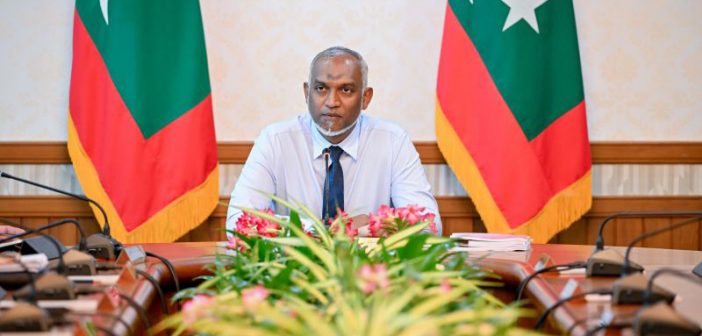Maldives President Mohamed Muizzu’s visit to India in early October 2024 marks a critical moment in the evolving relationship between the two nations. Despite his previous alignment with the “India Out” campaign during his election, Muizzu’s administration now seeks to recalibrate ties with India. This visit signifies a shift in his diplomatic stance and opens doors for strategic collaborations, as Maldives faces pressing financial and political challenges.
Bilateral Relations and the India Out Campaign
Muizzu’s initial political rhetoric focused on reducing Indian influence, particularly during his election campaign, which resonated with nationalist sentiments in Maldives. However, upon taking office, the realities of governance—especially Maldives’ economic dependence on India—have forced a shift. India has been a significant player in supporting Maldives through aid and infrastructure development, offering both financial and strategic assistance. The visit to New Delhi demonstrates Muizzu’s acknowledgment of India’s pivotal role in stabilizing Maldives’ economy, and may soften his earlier stance against Indian military presence on the islands.
Economic Necessity Drives the Agenda
Maldives is grappling with a serious economic crisis, including a ballooning debt and depleted foreign currency reserves. With public debt reaching an alarming 122.9% of its GDP in 2023, and risks of debt default looming large, Maldives urgently needs international support. During this visit, Muizzu is expected to seek financial aid and reaffirm bilateral agreements, particularly in areas like tourism, trade, and infrastructure. A potential $400 million currency swap deal under the South Asian Association for Regional Cooperation (SAARC) framework is on the agenda, which could help Maldives manage its foreign currency reserves and avoid a fiscal meltdown.
Strategic Importance for India
For India, maintaining stability in Maldives is critical. The country sits at a strategically vital point in the Indian Ocean, and its proximity to key shipping lanes makes it geopolitically important. Any instability in Maldives could open avenues for China’s growing influence in the region. By engaging Muizzu and offering financial lifelines, India aims to maintain its strategic foothold and counterbalance China’s Belt and Road Initiative, which has seen significant investments in Maldives over the past decade.
A Shift in Diplomacy
This visit underscores a broader diplomatic shift by Muizzu, indicating his intent to balance external relationships rather than leaning solely on China or distancing Maldives from India. It also offers him an opportunity to secure much-needed financial backing, with discussions focusing on trade, economic recovery, and defense cooperation. His willingness to soften the “India Out” stance reflects political pragmatism in dealing with economic realities.
For Maldives, this visit is crucial not only for avoiding financial catastrophe but also for repositioning itself in South Asia’s geopolitical landscape. By re-engaging with India, Muizzu demonstrates an understanding that Maldives cannot afford to lose the support of its closest neighbor. In the long run, strengthening ties with India might provide the stability needed to steer Maldives through its economic crises and allow for future growth.
Muizzu’s shift from anti-India rhetoric to active engagement reflects the complex interplay of domestic politics and international relations, as his administration seeks to balance nationalism with the pressing need for external support.






